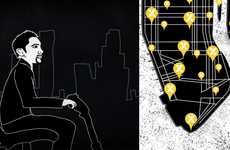
These Tactile Geometric Shapes Help the Visually Impaired See Colors
Katherine Pendrill — June 26, 2015 — Art & Design
The 'Feelipa Color Code' is a set of geometric shapes that can be used to help people who are visually impaired see colors. Easy to understand and to teach, the ingenious system provides a revolutionary way for people who are blind to experience the full spectrum of color.
The system works by using globally recognizable shapes as representations of color. Each color is assigned a physical shape and the mixing of colors is expressed through the natural agglutination of the shapes. The system is designed to help those who are visually impaired better understand a society that is often organized and driven by color.
In order to continue improving the design of the system, the makers of the Feelipa Color Code have been working closely with the Helen Keller Center. The ultimate goal is to incorporate the system into the school curriculum in order to help visually impaired students to understand and see colors.
The system works by using globally recognizable shapes as representations of color. Each color is assigned a physical shape and the mixing of colors is expressed through the natural agglutination of the shapes. The system is designed to help those who are visually impaired better understand a society that is often organized and driven by color.
In order to continue improving the design of the system, the makers of the Feelipa Color Code have been working closely with the Helen Keller Center. The ultimate goal is to incorporate the system into the school curriculum in order to help visually impaired students to understand and see colors.
Trend Themes
1. Tactile Color Coding - This trend presents an opportunity for businesses to develop tactile color coding systems for the visually impaired, enabling them to perceive colors in a new way.
2. Inclusive Design - The Feelipa Color Code highlights the need for industries to incorporate inclusive design principles, ensuring that products and services are accessible to all individuals, including those with visual impairments.
3. Assistive Technology - The development of the Feelipa Color Code showcases the potential for businesses to create innovative assistive technologies that enhance the lives of visually impaired individuals by providing them with new ways to perceive the world.
Industry Implications
1. Education - The Feelipa Color Code offers an opportunity for educational institutions and edtech companies to integrate tactile color coding into school curriculums, enhancing the learning experience for visually impaired students.
2. Fashion - The fashion industry can leverage the Feelipa Color Code by incorporating tactile color coding into clothing labels and accessories, allowing visually impaired individuals to make informed color choices when selecting outfits.
3. Technology - The Feelipa Color Code presents a disruptive innovation opportunity for technology companies to develop advanced devices or apps that utilize the color coding system, enabling visually impaired individuals to perceive and interact with colors in digital environments.
3.2
Score
Popularity
Activity
Freshness























